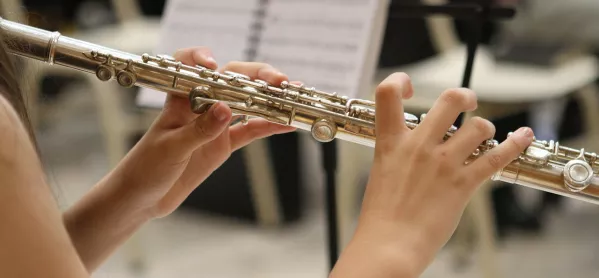The “very existence of music education” is under threat because the numbers of music teachers and pupils taking GCSE have both dropped, according to a “state-of-the-nation” report.
The report for the All-Party Parliamentary Group for Music Education says that music education is being eroded by a squeeze on funding and accountability pressures.
The report makes 18 recommendations, including calling for:
- A review of the English Baccalaureate, which currently does not include an arts subject;
- All secondary schools to have at least one full-time music teacher who exclusively teaches music;
- A “culture of singing” to be encouraged in all schools.
“Whilst the aspiration is for every child aged 5 to 14 to have regular access to music education through the school curriculum, evidence shows that the reality is somewhat different,” the report states. “A squeeze on funding and pressure on the curriculum due to accountability measures is the cause of this.
The decline of music in schools
“These are the same challenges as noted by Darren Henley in the [2011] Henley Review, but they have become so serious that they now challenge the very existence of music education.”
The report, Music Education: State of the Nation, includes an analysis of GCSE entries, taking into account the drop in the overall number of students in the Year 11 cohort.
The analysis shows that in 2014-15, 7.14 per cent of the cohort took GCSE music, compared with 5.95 per cent in 2017-18.
The report points out: “The government is, therefore, wrong to claim that music uptake at GCSE has remained broadly stable: in fact, using their own figures, the proportion of GCSE pupils taking music has fallen by almost a fifth since 2014-15.”
The authors, Alison Daubney, of the University of Sussex, Gary Spruce, of Birmingham City University and Deborah Annetts, chief executive of the Incorporated Society of Musicians (ISM), also say that between 2010 and 2017, the number of secondary school music teachers dropped by 1,000 from 7,500 to 6,500, according to Department for Education workforce data. The number of English and maths teachers rose over the same period.
And the report includes previous research from the Association of School and College Leaders showing that music is the fastest disappearing A-level subject, with the number of schools and colleges offering music dropping by 38 per cent between September 2016 and September 2018. Also, it features research by the ISM, which shows that the pressure of Sats meant that 50 per cent of primary schools surveyed did not sustain music teaching throughout Year 6.
The co-chairs of the APPG for Music Education, Diana Johnson, MP for Hull North, and Andrew Percy, MP for Brigg and Goole, said: “This report shows the scale of the crisis facing music education in England. It shows how government policy around accountability measures and the curriculum has contributed to a sharp decline in opportunities for pupils to have access to a music education.”
The DfE has been contacted for comment.




